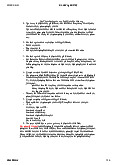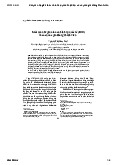


Preview text:
21:36 1/8/24 Speak
OPPORTUNITY FOR ECOTOURISM IN VIETNAM POST COVID-19
Vietnam has just recently reopened its border to welcome tourists after almost 2 years
of closure. That’s why this is considered to be a new start for tourism and there also
comes new opportunities, especially in Green Tourism. For me personally, a few
weeks ago, I was finally able to go on a short trip and experience living in nature; and
I noticed that in the new normal, ecotourism has great potentials, as after a long time
of social distancing and isolation, people are craving for new exploration in the nature
and community. There is also a growth in people’s willingness to explore zero-waste
lifestyle and aim to do something for the environment. I think this is a chance for
travel agency and local government, as well as residents to work together and create a
“green itinerary” that allows tourists to get access to “green travel journeys”. This can
be achieved, partly because Vietnam already offers a variety of natural ecosystems,
with famous World Heritage Sites. Also, the fact that many of these areas were not
open to tourists during the previous time of pandemic creates conditions for nature to
recover its beauty. So what’s left is that we should utilize these advantages to expand
ecotourism activities, not only to contribute to tourism recovery and development, but
also to conserve the environment in the long run.
HANOI’S PLAN TO BAN MOTORBIKES IN 2025
Since last year, the municipal authority of Hanoi has been considering a ban on
motorbikes in inner-city districts from 2025. The aim is to reduce congestion and
control pollution in the central areas. However, considering the capital’s current
situation, there are still many shortcomings in implementing this policy. The first
reason is that after limiting motorbikes, people will be encouraged to commute by
public transport; yet the number of public vehicles now is inadequate to meet the
travel demand in the city. Even with the recently opened Cat Linh – Ha Dong metro
service, along with the proposed Nhon – Hanoi Railway Station route, each would
only be able to meet 5-7% of the need. So it is suggested that there should be
designated areas to limit or ban motorbikes, instead of having a carpet ban in entire
districts; and only when public transport can meet 60-70% of travel needs should
Hanoi ban personal vehicles. Second, banning motorbikes could possibly cause people
to switch to cars and that means worsening traffic jams since a car takes up 5 times the
space of a motorbike. This occurence can also lead to serious air pollution. And even
more, the fact is that not everyone can afford a car, then how would they be able to
travel long-distance route? So that’s why I believe the first thing that the capital
should do is to reevaluate the programme, speed up its metro projects and convince more people to use them. about:blank 1/3 21:36 1/8/24 Speak
PRIVACY CHALLENGES ASSOCIATED WITH COVID-19 TRACING APPS
At the end of 2019, the spread of COVID-19 gained attention and soon hit its peak of
positive cases with increasing death toll. Therefore, strategies to curb the widespread
of the virus have been put into practice. One potential measure is the use of contact
tracing apps where people provide their data as a way to allow public health officials
to map and find all recent contacts of the person if they are at risk of being infected.
This technology helps make informative decisions that are crucial for the prevention
of COVID-19, yet, as a health tracking app, it poses a significant threat to the privacy
of individuals since it collects large amounts of personal information including
location, travel, and personal health status. Also for many people, there maybe some
concern that the government will use or disclose their personal data for other purposes
than solely fighting the spread of virus. This might not be considered as a new
problem since there has been cases of how smartphone and tracing apps intrude user’s
privacy; but I believe in order to assuage privacy concerns, government must gain
public’s trust by setting out exactly what the data is going to be used for, for how long,
how it can be deleted or protected. If they fail to do that, it is likely that the numbers
of app-users would show a sharp decline and any benefit of the app would be lost.
BUSINESS STRATEGIES FOR SURVIVING THE PANDEMIC
The COVID-19 pandemic has been far from easy for both large and small businesses.
Companies from all over the world have had to adapt to changed circumstances and
find opportunities in times of crisis. After 2 years, many businesses have proved their
value by experimenting and implementing different strategies in order to survive, or
even develop. One of the most noticeable and effective moves is taking businesses
online. The pandemic has seen the closure of all non-essential businesses like
cinemas, museums and shops; this has forced companies to digitalise their business.
With fewer people able to leave their homes, consumer habits have changed and e-
commerce has become the main method of purchasing. Another feasible approach is
rebranding the company image, especially for small businesses since they have
suffered from the pandemic more than larger ones. So with fewer resources to fall
back on and a smaller network of customers, one strategy fpr keeping up with the
larger companies is rebranding. Changing the company image or offering new
services that respond to new trends is a great way for companies to distinguish
themselves from the competition. So these 2 strategies can be seen as the most
common, yet effective methods that many businesses have been using to thrive
through the pandemic. However, it is not an easy task for any company to make the
most of them since development and success require other factors as well. VOLUNTOURISM about:blank 2/3 21:36 1/8/24 Speak
For this topic, I will talk about my opinion on 1 of the most famous types of
purposeful travel, which is voluntourism. So voluntourism or volunteer tourism is
basically a hybrid of traveling and volunteering. It’s where you follow a planned-out
package that includes sightseeing trips and some volunteering work like teaching
children, building necessary infrastructure, animal rescue work, etc. In recent years,
especially during the pandemic, voluntourism trips have gained attention due to the
value it has brought to individuals and society; however, many people consider
voluntouring a curse in disguise. Looking into its pros, besides being able to enjoy
ourselves in beautiful surroundings, we are provided a much more authentic
experience while spending time with a local community than sitting in a resort. Also,
when done the right way, voluntourism can help communities grow and truly bring
benefits to a specific cause. On the other hand, voluntourism can be as harmful as it is
useful, and perhaps the worst cases involve the exploitation of children. Some travel
companies make use of vulnerable children and parents for the sole purpose of
attracting volunteers willing to pay big money to “help someone in need”. Another
cons is when volunteers show up to do work, they’re often putting local labourers out
of work so that they can follow their itinerary. Consequently, local economy might be
disrupted. Still, I believe that’s not to say that voluntourism should be avoided
altogether, but voluntourists should understand their aim or purpose and do some
research before deciding to do these value-driven travel. about:blank 3/3




